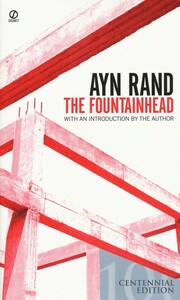You need to sign in or sign up before continuing.
Take a photo of a barcode or cover
Some people are fanatical about this book; I'm not. I liked it even though I don't agree with Ayn Rand's objectivism.
Rand is a compelling story teller, if however quite literal and blunt with her devices. The philosophy of objectivism and Howard Roark's outlook makes sense as a way to stick it to communism, but when applied to the real world seems conceited and more of an excuse to feel no empathy than a way to uphold the creativity of man. the relationship between Dominique and Roark is problematic in the sense that she becomes his possession when in fact she understands Roark as well or better than most, yet remains below him. I kept asking why Rand chose to devolve Dominique from an outspoken, uncontrollable, self sufficient woman into someone who submits to Roark without question. Overall, engaging, but with ideas that are dysfunctional or troubling to women.
Overall, this is not only great fiction, but Rand also has some great ideas which are presented with an uncanny amount of clarity.
The architectural profession serves as the backdrop for the story. The story itself is quite interesting; either Rand did a great deal of research or she did a good job faking it. I maintained a complete disinterest in architecture before reading the book, but still found myself actively engaged while Rand discussed the matter. I wonder how many young readers are steered towards the profession after reading this book for the first time.
With the exceptions of a few monologues that went on a bit too long, the story kept me engaged for the entire 700 pages. The characters are well developed; I found myself attached to some while despising others. There is adequate conflict to keep the plot moving.
While I understood the motivations of the actions carried out by Dominique and Roark, the actions themselves bordered on the edge of the extreme. At various times in the book, both engage in acts of violence and destruction which don't seem completely rational. These issues aside, it's a very well written book.
As to the philosophy.....
Rand's message is fairly clear. She doesn't abstract the message at all. In fact, she grinds it in as thoroughly and as clearly as she can.
The book provides us with Howard Roark as Rand's idea of an ideal man. He never falters in his convictions. He remains completely independent and relies on nobody. His only interest is to his work; to the manifestation of his creative genius. He doesn't care what others think - he only cares about his own productive achievements. He is an egotist - a term which carries a positive connotation in her book. She argues that it's the egotistical desire of man that build great civilizations.
“All that which proceeds from man’s independent ego is good. All that which proceeds from man’s dependence upon men is evil.”
The book is full of weaker people like Peter Keating. Keating lives through the thoughts and feelings of others. He is completely dependent upon others to justify his existence. Through Roark and Keating, Rand asserts that dependence upon other men is evil in nature. Keating lives not for himself, but for others. Rand has a title for such people - second handers. He can't do what he desires, as he is constantly worried about how others think of him.
In a world where self-interest is ideal, acts of altruism are counterproductive and should be despised. At first I was lost on this point, as it didn't seem to me that altruism was necessarily all bad. I see no problem with people giving of themselves to people they love. I also don't see a problem with my donating money to various charitable endeavors. After reading The Fountainhead, I now see that such acts are not altruism.
Altruism is the unselfish concern for the welfare of others - a state of complete selflessness. When I give to those I love or to causes I believe in, my actions are selfish. I provide for my family because I hold them to be the most important thing in my life. That check to the local SPCA goes towards providing a better life for animals, a cause I place some value in. Charity and kindness are not altruism; they're actually quite selfish acts.
However, to an extent society seems to feel that I should give to those who are less fortunate with no care for myself simply because the intended recipient is deemed to need such assistance by those who insist that I give it. Most social welfare programs are like this. I am forced to pay taxes on my earnings, which are then distributed to others via a variety of social programs despite the fact that I have no interest giving in such a fashion. This is nothing more than forced altruism.
The architectural profession serves as the backdrop for the story. The story itself is quite interesting; either Rand did a great deal of research or she did a good job faking it. I maintained a complete disinterest in architecture before reading the book, but still found myself actively engaged while Rand discussed the matter. I wonder how many young readers are steered towards the profession after reading this book for the first time.
With the exceptions of a few monologues that went on a bit too long, the story kept me engaged for the entire 700 pages. The characters are well developed; I found myself attached to some while despising others. There is adequate conflict to keep the plot moving.
While I understood the motivations of the actions carried out by Dominique and Roark, the actions themselves bordered on the edge of the extreme. At various times in the book, both engage in acts of violence and destruction which don't seem completely rational. These issues aside, it's a very well written book.
As to the philosophy.....
Rand's message is fairly clear. She doesn't abstract the message at all. In fact, she grinds it in as thoroughly and as clearly as she can.
The book provides us with Howard Roark as Rand's idea of an ideal man. He never falters in his convictions. He remains completely independent and relies on nobody. His only interest is to his work; to the manifestation of his creative genius. He doesn't care what others think - he only cares about his own productive achievements. He is an egotist - a term which carries a positive connotation in her book. She argues that it's the egotistical desire of man that build great civilizations.
“All that which proceeds from man’s independent ego is good. All that which proceeds from man’s dependence upon men is evil.”
The book is full of weaker people like Peter Keating. Keating lives through the thoughts and feelings of others. He is completely dependent upon others to justify his existence. Through Roark and Keating, Rand asserts that dependence upon other men is evil in nature. Keating lives not for himself, but for others. Rand has a title for such people - second handers. He can't do what he desires, as he is constantly worried about how others think of him.
In a world where self-interest is ideal, acts of altruism are counterproductive and should be despised. At first I was lost on this point, as it didn't seem to me that altruism was necessarily all bad. I see no problem with people giving of themselves to people they love. I also don't see a problem with my donating money to various charitable endeavors. After reading The Fountainhead, I now see that such acts are not altruism.
Altruism is the unselfish concern for the welfare of others - a state of complete selflessness. When I give to those I love or to causes I believe in, my actions are selfish. I provide for my family because I hold them to be the most important thing in my life. That check to the local SPCA goes towards providing a better life for animals, a cause I place some value in. Charity and kindness are not altruism; they're actually quite selfish acts.
However, to an extent society seems to feel that I should give to those who are less fortunate with no care for myself simply because the intended recipient is deemed to need such assistance by those who insist that I give it. Most social welfare programs are like this. I am forced to pay taxes on my earnings, which are then distributed to others via a variety of social programs despite the fact that I have no interest giving in such a fashion. This is nothing more than forced altruism.
challenging
reflective
slow-paced
Plot or Character Driven:
A mix
Strong character development:
Complicated
Loveable characters:
No
Diverse cast of characters:
No
Flaws of characters a main focus:
Complicated
challenging
dark
informative
reflective
sad
medium-paced
Plot or Character Driven:
Plot
Strong character development:
No
Loveable characters:
No
Diverse cast of characters:
No
Flaws of characters a main focus:
Yes
I loved this book. It is maybe the only book that both Matthew and I each love. No one is better with character development. A must read for any avid reader.
challenging
inspiring
reflective
medium-paced
Plot or Character Driven:
Character
Strong character development:
Yes
Loveable characters:
Yes
Diverse cast of characters:
Complicated
“He could not name the thing he wanted of life. He felt it here, in this wild loneliness.”
Page 1 - Part Four - Howard Roark
Page 1 - Part Four - Howard Roark
dark
tense
"Everything that can't be ruled, must go."
De filosofie achter dit boek is doodeng, maar als verhaal was het heerlijk.
De filosofie achter dit boek is doodeng, maar als verhaal was het heerlijk.
The characters are all flat and like 85% of them don't have a personality.
This would be a 5-star read if Ayn Rand didn’t hate women so much







